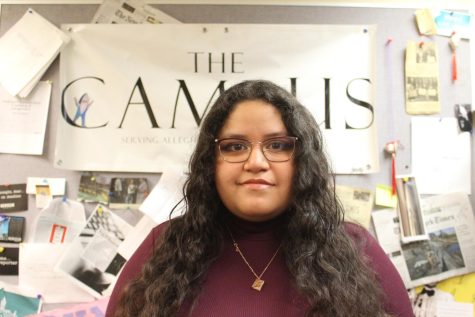SET earnestly sets Victorian standards with production of “The Importance of Being Earnest”
The audience erupted with laughter as Mr. Worthing lunges at Miss Prism, mistakenly thinking she is his mother who accidentally misplaced him in a handbag 20 years back. The scene was part of the Student Experimental Theatre’s production of “The Importance of Being Earnest” by Oscar Wilde, which ran on Friday, April 7, and Saturday, April 8, in Ford Chapel.
“The Importance of Being Earnest” is a satirical play about Victorian society, known for its strict and hypocritical conventions. The play explores the ridiculousness of social conventions and the importance of staying true to oneself. The play was first performed in 1895 in London.
Co-Director Mycah Quevillon, ’25, said she was first introduced to the play in her high school AP Literature course, and drawn back to it in college.
“I remember being in class and cracking up at all these really old-timey jokes and I thought that was such a funny play,” Quevillon said. “Plus, it has a lot of historical significance as Oscar Wilde, the playwright, is now known to be a gay man, and so the importance of LGBTQ representation has its own significance.”
There were significant delays at the beginning of rehearsals because two of the actors had gotten COVID-19, according to Quevillon. As a result, the play was changed from being completely memorized to being a stage read.
“Our actors would have their scripts on stage with them but as part of the play itself because all of the characters have journals where they write in,” Quevillon said. “We overcame the immersion-breaking by making sure our actors know that the scripts are an aid to them, but they shouldn’t be necessarily needed at all times.”
Co-Director Madeline Segar, ’24, explained that actors had a lot of creative liberty when it came to performing their characters.
“It was a lot of relying on the actor’s gut instincts because they have pretty well-developed comedic instincts,” Segar said. “Going with their immediate thought on the character and honing those as opposed to adapting different characterizations has been the approach that has worked best.”
Segar was recently involved in Playshop Theatre’s “Machinal,” which, they said, was a more intense experience. Segar was working on both productions at the same time.
“It has been very tiring and fulfilling,” Segar said. “I like the amount of work I was able to get done this semester, but at the same time, it was a challenge to keep everything organized. ‘Earnest’ definitely has a less serious tone which I think was refreshing because I think if I was going between two pretty dark shows it would have been tough.”
Actor Jane Grabowski, ’24, played Miss Prism, a middle-aged woman who is the governess of the main character’s love interest. Grabowski said that she did not audition for the specific role and had asked the directors to place her in whatever role they chose. The actors began rehearsing halfway through February four times a week for two hours.
“I have to stand up really straight, roll my shoulders back and put my chin up really high,” Grabowski said. “I’ll clench my jaw and make myself really stern like an old mean nun. I am trying to project it throughout in my lines, body and personality.”
Grabowski said one of the biggest challenges at rehearsals was rehearsing with friends because of the comedic nature of the play.
“I am friends with a lot of the other actors so it’s just been so much fun that it is hard to get to work and focus because it is just so funny,” Grabowski said. “Staying in character and not breaking has been the most challenging thing.”
Grabowski believes that getting involved in art is important and that having shows every semester can give students the opportunity to create and collaborate.
“I think it is important to tell these stories, even when they are older,” Grabowski said. “This was published over 100 years ago but it is still really relevant and still really funny so I think retelling these stories is really important in reminding us that humans are humans no matter when or where.”

Evelyn Zavala is a senior from San Francisco. She is majoring in Business and minoring in Journalism in the Public Interest. This is her fourth year on...






